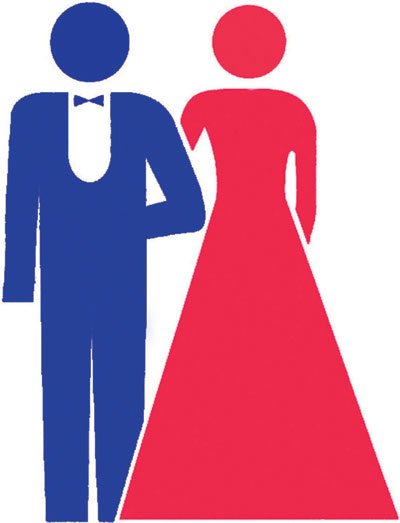At work, she’s Ivy Villegas.
At home and to her friends, she’s Ivy Villegas Borges.
When it comes to her kids, she’s typically Ivy Borges.
To the people who send her junk mail, she’s Ivy
Villegasborges.
At work, she’s Ivy Villegas.
At home and to her friends, she’s Ivy Villegas Borges.
When it comes to her kids, she’s typically Ivy Borges.
To the people who send her junk mail, she’s Ivy Villegasborges.
And to the phone book company, she’s Ivy Villegas-Borges.
Confused? Don’t worry, Hollister resident Ivy Villegas Borges – yes, that’s the correct way to do it – is used to people scratching their heads when trying to figure out exactly what her name is.
“I never really anticipated changing my name when I got married; I was just going to keep my maiden name, Villegas,” said Villegas Borges. “But about two weeks before my wedding, my husband said he thought he might like to be a little more traditional and have me take his name. We talked about it and figured out what worked for us. This way, I have my husband’s name, but I still kept the name I had for 30 years before we got married. I didn’t want to give that up just because I was getting married, and it also helps me hang on to my Hispanic roots.”
The thought Villegas Borges and her husband put into her last name is not unique. Ever since the feminist movement in the 1960s and 1970s, hyphenated names and women keeping their maiden names has been a fairly common practice. The tradition of women taking their husband’s last name at marriage is no longer a given.
So, at work, Villegas Borges just uses her maiden name. Legally, she has both names, but no hyphen. Once her two children came along, it became easier to refer to herself only by her married name to avoid confusion when doing things such as making doctor’s appointments for the kids.
But if the last name issue seems so five minutes ago, think again. A 2004 Harvard University study looking at Massachusetts birth records found that 23 percent of college-educated women kept their maiden name in 1990, but that number fell to 17 percent in 2000. Another survey of Harvard alumnae showed that, 10 years after graduation, 44 percent of 1980 graduates kept their own last names at marriage, while just 32 percent of 1990 graduates kept theirs.
Gilroy resident Hope Cerdan, who will be getting married next month, said she’s going to take the traditional route and change her last name.
“My fiance’s last name is Harlan and I fully intend to take his last name as my own when we tie the knot,” she said. “To me, marriage is when two people become one and are fully united. To me, it feels like when a woman keeps her (maiden) last name and hyphenates it with her husband’s, she doesn’t want to fully unite with her husband.”
Cerdan represents the statistical majority. A 2001 survey by Bride’s magazine found that 8 percent of women getting married chose to hyphenate their name, 3 percent kept their maiden name and 83 percent changed their last names.
“The hyphenated names or keeping the maiden name is a product of the women’s movement in the ’50s, ’60s and ’70s, and in some instances, it’s a cultural thing, such as in many Hispanic cultures where people use both their mother’s and father’s last names,” said Anthony Villarreal, a sociology instructor at Gavilan College. “But I think there’s a changing conception of women’s liberation, and some people actually call this a post-feminist world. It comes down to several generations of women who don’t have a sense of struggle for equal rights. They were born into a world where they inherited the gains of a past struggle. They presume equality, so giving up their last name isn’t a threatening thing.”
Yet even as many modern women don’t view a change in last name as a threat, many men who see themselves as part of the struggle for women’s equality have added an additional twist to the issue, Villarreal said.
“There are men out there who are part of what’s been called the men’s movement who have taken their wife’s last name as their own,” he explained. “There was an interesting case with the Los Angeles mayor (Antonio Villaraigosa). When he married his wife, they merged both of their last names and they both took the new name.”
Antonio’s last name was Villar and his wife Corina’s last name was Raigosa. The couple is now divorcing, but Villaraigosa has said he will not change his name back to Villar, according to his office.
Gilroy residents Christine Griffin-Janisch and Mary Hults-Schiltz both said feminism didn’t play a role in their decisions to hyphenate their last names.
“I’m a high school teacher, so for about a decade I was Miss Griffin, and to suddenly be Mrs. Janisch one day was too strange,” Griffin-Janisch said. “To me, Mrs. Janisch is my mother-in-law. So, I chose to hyphenate.”
Hults-Schiltz said she chose to have both last names primarily because her college degree and nursing assistant certificate were both under her maiden name, so she didn’t want to give it up.
When it came to their kids, Villegas Borges, Griffin-Janisch and Hults-Schiltz all said they decided to only give them their husbands’ last names because the combined last names are such a mouthful. A Web site for parents of University of California at Berkeley students, http://parents.berkeley.edu, has a whole advice page about hyphenated last names and how their kids deal with them, if they regret passing on hyphenated last names and trying to figure out what happens if their child with a hyphenated last name marries another child with a hyphenated last name.
“I say do whatever works for you,” Griffin-Janisch said. “Sit down as a couple, talk about it and do whatever you think is best. I say as long as it’s legal and it doesn’t hurt anyone, go for it.”












